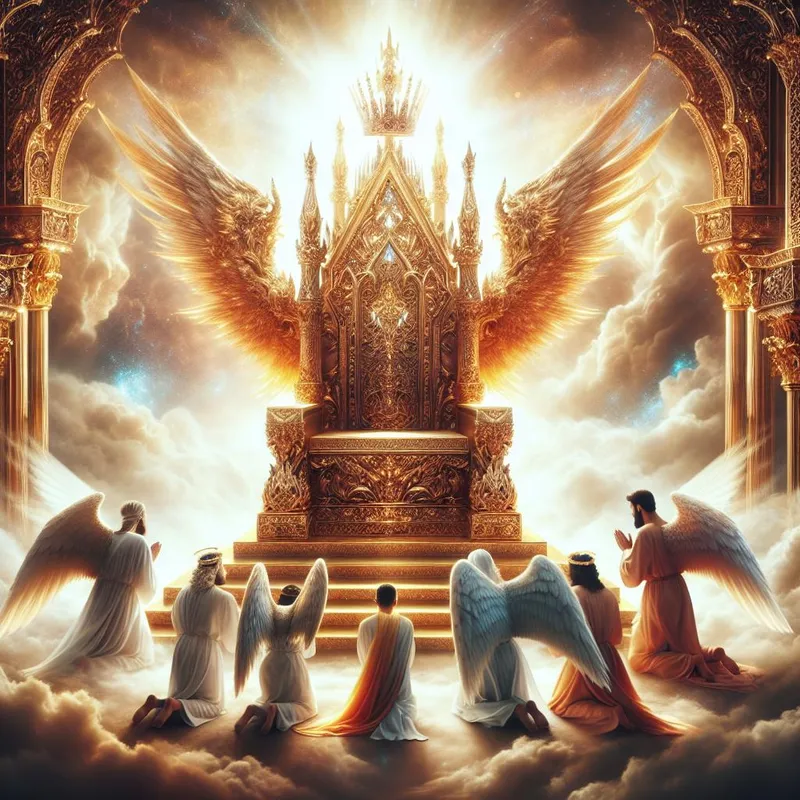
'Unveiling the Majesty: The Throne of God Revealed in Scripture'
Posted on 29 May 2024
Throne of God
The throne of God is a concept found in the Bible that symbolizes God's transcendence, dignity, and sovereign rule. Although the throne of God is often described in physical terms, it is important to understand that these descriptions are anthropomorphisms—figures of speech used to help us comprehend the incomprehensible nature of God.
What Is the Throne of God?
In various biblical passages, references to the throne of God can be found. For example, Matthew 5:34 states that heaven is God's throne, echoing the words of Isaiah 66:1. These references emphasize the heavenly and transcendent nature of God's existence. It is crucial to recognize that the throne of God is not a physical object but rather a symbol used to convey His magnificence and exalted position.
The Symbolic Nature of the Throne
As an incorporeal being, God does not possess a physical body and does not literally "sit" on a throne. Instead, descriptions of the divine throne are meant to help us grasp God's character and attributes. Just as phrases like "the hand of God" or "the eyes of God" are figurative expressions, references to the throne serve as anthropomorphic language used to communicate divine concepts in terms we can understand.
Biblical Descriptions of the Throne
In Isaiah 6:1, the prophet Isaiah sees a vision of the Lord "high and exalted, seated on a throne." This vision illustrates the splendor and exaltation of God's being, rather than describing a literal seat. Similar depictions can be found in visions experienced by prophets such as Ezekiel and John.
In 2 Chronicles 18:18, Micaiah describes a vision in which spirit beings stand in attendance within God's throne room. This vision parallels Job 1:6, where angelic beings gather before God to give an account. These passages highlight the heavenly court and the authority of God as the ultimate judge.
Jesus and the Throne of God
The ascension of Jesus to heaven is described in Hebrews 12:2, stating that He "sat down at the right hand of the throne of God." This signifies Jesus' exalted position and His ultimate authority alongside God. It indicates that there is no higher place than heaven, and Jesus holds a place of honor next to God.
The Throne as a Symbol of Judgment and Mercy
The Bible also depicts the throne of God as a symbol of judgment. Psalm 9:7 declares, "He has prepared His throne for judgment," while Revelation 20 describes a great white throne where the final judgment will take place. However, God's throne also represents mercy and grace. Hebrews 4:16 encourages believers to approach God's throne of grace with confidence, seeking mercy and finding grace in times of need.
Worship Around the Throne
John's vision in Revelation includes scenes where heavenly beings sing praises to the One who occupies the throne. The book describes a "new song" sung in worship (Revelation 14:3), and praise surrounding the throne is depicted as glorious (Psalm 66:2). Only those who have been redeemed through Christ can stand before God's throne (Revelation 14:5), emphasizing the privilege reserved for His children.
The Future Bowing Before God's Throne
Philippians 2:9–11 reveals that one day, all creation will bow before the majesty of God's throne. The regal beings surrounding the throne will lay their crowns before Him, acknowledging His worthiness to receive glory, honor, and power (Revelation 4:10–11).
Why This Matters
Understanding the symbolism behind the throne of God helps us grasp the transcendence and sovereignty of our Creator. It reminds us that God is ultimately in control and holds the highest authority. The throne of God signifies both judgment and mercy, reminding us of the importance of seeking His grace and forgiveness. Recognizing the honor bestowed upon Jesus as He sits at the right hand of the throne of God deepens our understanding of His role in our salvation.
Think About It
Consider the significance of the throne of God in your own faith journey. How does understanding the symbolism behind it impact your view of God's sovereignty and authority? How does knowing that Jesus sits at the right hand of God's throne affect your understanding of His role as Savior and Lord? Take a moment to reflect on the privilege of approaching God's throne of grace with confidence, seeking His mercy and finding His abundant grace in times of need.
